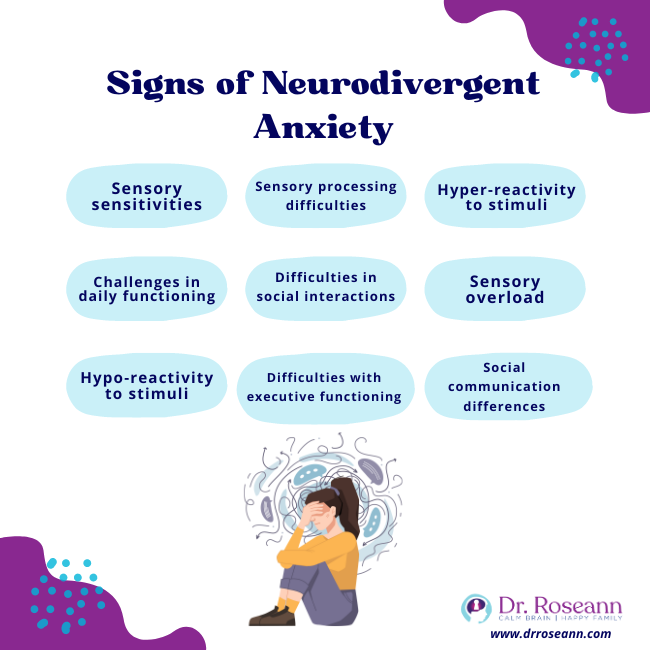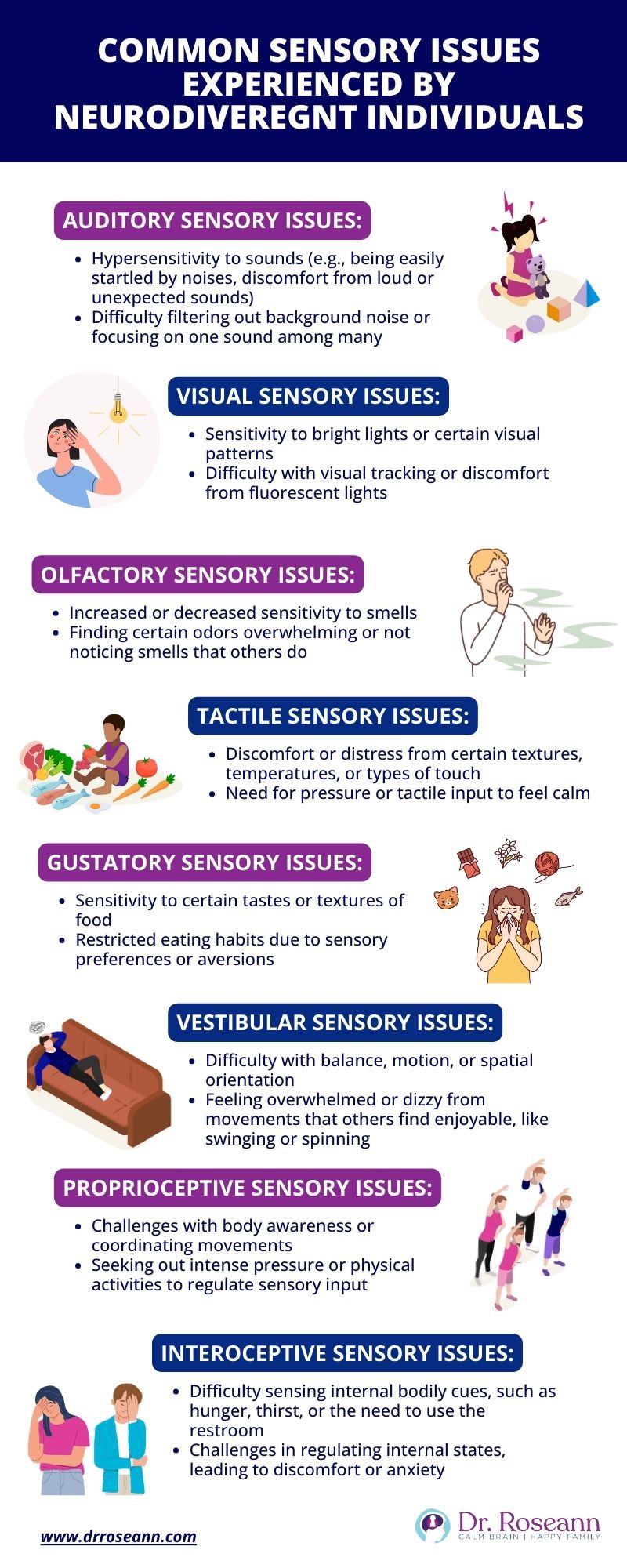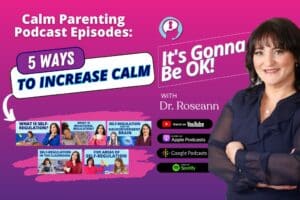Anxiety disorders are prevalent mental health conditions affecting millions globally. But are they considered neurodivergent?
It is definitely a complex issue! Helping kids with anxiety has been one of my priorities in the last three decades because I’ve seen how childhood anxiety can profoundly impact a family's and child's well-being. When not addressed, anxiety can affect them long into adulthood. That is why natural solutions for parents and families are especially critical.
What is Neurodivergent Anxiety?
While anxiety is not exclusive to neurodivergent individuals, it intersects with neurodiversity due to the wide variety of manifestations and impacts. High functioning anxiety disorder, for instance, presents challenges in social and occupational settings similar to other neurodivergent conditions.
The question of whether anxiety is inherently neurodivergent prompts exploration into the broader landscape of neurodivergence. Neurodivergence refers to a spectrum of cognitive and developmental differences, including neurodivergent types such as attention deficit hyperactivity disorder (ADHD), autism spectrum disorder (ASD), and others.
Considering the complexity of neurodivergent anxiety, it's crucial to address common misconceptions and stigmas surrounding mental health. While some may question, “Is anxiety considered neurodivergent?” The reality is that individuals with anxiety can experience a range of neurodivergent symptoms and challenges.
For those navigating high-functioning anxiety, the line between managing daily tasks and feeling overwhelmed can blur. This experience resonates with neurodivergent individuals, who may also struggle with heightened sensory sensitivities, executive functioning difficulties, and other aspects of neurological divergence.
Moreover, neurodivergent anxiety intersects with co-occurring conditions, such as depression, further complicating the landscape of mental health. Understanding the interconnectedness of anxiety and neurodivergence is essential for providing comprehensive support and resources to individuals navigating these challenges.
Ultimately, whether one asks, “Does anxiety count as neurodivergent?” or ponders the broader implications of neurodivergent anxiety, fostering understanding and acceptance is paramount. Recognizing the unique experiences and needs of neurodivergent individuals allows us to create more inclusive and supportive environments for all.
Distinct Features and Experiences
Understanding neurodiversity or neurodivergent anxiety involves recognizing its distinct features and experiences. Individuals with anxiety may exhibit sensory sensitivities, sensory processing difficulties, and hyper- or hypo-reactivity to stimuli. These sensory issues, common in neurodivergent individuals, contribute to the complex nature of anxiety.
Furthermore, neurodivergent anxiety may present unique challenges in daily functioning and social interactions. It's essential to acknowledge that neurodivergent individuals often navigate a world designed for neurotypical experiences, which can exacerbate feelings of anxiety and neurodivergent overwhelm.
Sensory overload, difficulties with executive functioning, and social communication differences are among the factors that may amplify neurodivergent anxiety.

Overlap with Different Types of Neurodivergent Disorders
Anxiety often coexists with other neurodivergent types, such as Attention Deficit Hyperactivity Disorder or Autism Spectrum Disorder. The overlap between anxiety and ADHD, for example, underscores the multifaceted nature of neurodiversity.
Furthermore, sensory processing disorder (SPD) often intersects with neurodivergent anxiety, amplifying the challenges individuals face in managing their anxiety symptoms (McMahon et al., 2019). Neurodivergent kids with sensory processing disorder may encounter heightened sensitivity to environmental stimuli, leading to increased levels of neuro anxiety and stress in everyday situations.
Understanding the overlap between neurodivergent anxiety and other neurodivergent behaviors provides insights into the diverse experiences and manifestations of anxiety within neurodiverse populations.
Individual Experiences
Acknowledging the diverse nature of neurodivergent anxiety, it's crucial to recognize that each individual's journey is unique and multifaceted. Processing issues in kids and adults with neurodivergent anxiety can manifest in various ways, from heightened sensory sensitivity to challenges in regulating sensory input.
For kids with attention deficit hyperactivity disorder, navigating sensory issues may present distinct anxiety challenges compared to those with sensory processing disorder. While both conditions involve sensory processing difficulties, the underlying mechanisms and manifestations can differ significantly.
Some individuals may experience sensory overload, characterized by an overwhelming response to environmental stimuli, while others may struggle with sensory modulation, causing difficulties in regulating sensory input.
Understanding the intricate interplay between ADHD and sensory processing issues is essential in providing tailored support and intervention. Sensory issues in ADHD can exacerbate symptoms of neurodivergent anxiety, contributing to feelings of overwhelm and distress in sensory-rich environments.
Furthermore, sensory issues often intersect with other aspects of neurodiversity, such as ASD. While sensory processing disorder is not exclusive to autism, it is commonly associated with the condition, highlighting the complex interconnections within neurodivergent profiles.
Individuals with ASD may experience sensory integration difficulties alongside neurodivergent anxiety, further amplifying the challenges they face in navigating everyday experiences (Cullingham et al., 2023).

Treatment for Neurodivergent Anxiety
Addressing neurodivergent anxiety necessitates a comprehensive and individualized approach that takes into account the unique needs and challenges of each person. For individuals with sensory processing disorder (SPD), interventions may focus on providing sensory accommodations to mitigate sensory overload and promote sensory regulation.
This neurodivergent treatment method could involve creating sensory-friendly environments, offering tools such as noise-canceling headphones or weighted blankets, and implementing sensory breaks to allow individuals to recalibrate their sensory systems.
Similarly, for those with attention deficit hyperactivity disorder (ADHD), sensory sensitivity can exacerbate feelings of anxiety and overwhelm. Tailored strategies may include incorporating sensory-friendly elements into daily routines, such as minimizing distractions in work or learning environments and providing opportunities for movement breaks to help regulate sensory input.
In addition to addressing sensory issues, it's crucial to recognize and validate the emotional experiences of individuals with neurodivergent anxiety. Psychoeducation and cognitive-behavioral therapy (CBT) can be valuable tools in helping individuals understand and manage their anxiety symptoms.
These approaches may involve identifying and challenging anxious thought patterns, developing coping skills to manage stress, and practicing relaxation techniques to promote emotional regulation.
Furthermore, fostering a supportive and inclusive community is essential in reducing the stigma surrounding neurodivergent tendencies while promoting acceptance. This includes creating spaces where individuals feel safe to express their unique needs and experiences without fear of judgment or discrimination.
Undergoing a neurodivergency test can help raise awareness and promote neurodiversity acceptance. When society starts to work towards building a more inclusive and equitable future for all individuals regardless of their neurological differences, everybody wins.
What is neurodiversity?
Neurodiversity refers to the variation in neurological traits and abilities among individuals, encompassing differences in brain function and behavior. It celebrates the diversity of neurological characteristics, recognizing them as natural variations in the human population.
Is anxiety a neurodiversity?
Yes, anxiety can be considered a form of neurodiversity, as it reflects variations in brain function and behavior. However, not all instances of anxiety indicate neurodiversity, as anxiety can also arise from environmental factors or situational stressors.
What are neurodivergent traits?
Neurodivergent characteristics encompass a wide range of cognitive, emotional, and behavioral characteristics that deviate from what is considered typical or “neurotypical.” These traits may include sensory sensitivities, processing differences, and unique ways of thinking or experiencing the world.
Is high functioning anxiety real?
Yes, high functioning anxiety is a recognized phenomenon where individuals experience anxiety but maintain a high level of performance in daily activities. While not an official diagnosis, many neurodiverse people identify with the term to describe their experiences of managing anxiety while appearing functional.
Is depression and anxiety neurodivergent?
While depression and anxiety are not exclusive to neurodivergence, they can intersect with neurodiversity due to their impact on brain functioning and neurodivergent individuals may be more prone to experiencing them.
Does OCD count as neurodivergent?
Yes, OCD is classified as a neurodivergent disorder characterized by intrusive thoughts and compulsive behaviors that affect daily functioning. Neurodivergent OCD children may display neurodivergent traits, which can include sensory sensitivities, processing differences, and unique cognitive patterns.
Are people with ADHD neurodivergent?
Yes, individuals with ADHD (Attention Deficit Hyperactivity Disorder) are considered neurodivergent due to differences in brain structure and functioning. The list of neurodivergencies of ADHD encompass challenges in attention regulation, impulse control, and hyperactivity.
Is generalized anxiety disorder neurodivergent?
Generalized Anxiety Disorder (GAD) can be considered neurodivergent as it involves excessive worrying and anxiety that can impact daily life functioning.
Who is neurodivergent?
Individuals who have neurological differences, such as ADHD, autism spectrum disorder (ASD), OCD, or other conditions, are often considered neurodivergent.
Is social anxiety neurodivergent?
Social Anxiety Disorder, characterized by intense fear or discomfort in social situations, can be considered neurodivergent due to its impact on social interactions and functioning.
Is GAD neurodivergent?
Yes, Generalized Anxiety Disorder (GAD) is classified as a neurodivergent condition characterized by persistent and excessive worrying.
Is ADHD neurodiversity?
Yes, ADHD (Attention Deficit Hyperactivity Disorder) is considered a form of neurodiversity due to variations in cognitive processes and attention regulation.
Am I neurodivergent or traumatized?
Determining whether you are neurodivergent or traumatized requires professional evaluation and consideration of your symptoms and experiences. Neurodivergence refers to inherent neurological differences, while trauma pertains to adverse experiences that impact mental health, and a qualified mental health professional can help differentiate between the two.
Is depression neurodivergent?
Yes, depression can be considered neurodivergent as it involves dysregulation of neurotransmitters and affects brain function and mood. However, it's essential to note that not all cases of depression are inherently neurodivergent depression, as depression can also result from environmental factors or life events.
Are people with anxiety neurodivergent?
Yes, people with anxiety can be considered neurodivergent, as anxiety disorders involve neurotransmitter imbalances and atypical patterns of activity in the neurodivergent brains. However, it's important to recognize that not all individuals with anxiety are necessarily neurodivergent, as anxiety can also arise from environmental stressors or situational factors.
Is bipolar neurodivergent?
Yes, bipolar disorder is considered neurodivergent as it involves distinct variations in mood, energy levels, and behavior. Individuals with bipolar disorder may experience episodes of mania, hypomania, or depression, reflecting the neurodiverse nature of their condition.
Citations
Cullingham, T., Rennard, U., Creswell, C., Larkin, M., Milton, D., Godber, L., Karen Leneh Buckle, Gordon, K., & Green, J. (2023). Co-production of a Neurodiversity-Affirmative Anxiety Intervention for Autistic Children. MedRxiv (Cold Spring Harbor Laboratory). https://doi.org/10.1101/2023.07.05.23292219
McMahon, K., Anand, D., Morris-Jones, M., & Rosenthal, M. Z. (2019). A Path From Childhood Sensory Processing Disorder to Anxiety Disorders: The Mediating Role of Emotion Dysregulation and Adult Sensory Processing Disorder Symptoms. Frontiers in Integrative Neuroscience, 13. https://doi.org/10.3389/fnint.2019.00022
Dr. Roseann is a mental health expert in Neurodivergence who frequently is in the media:
- Break the Rules Podcast Overcoming Anxiety & Mental Health Disorders.
- CBS2 New York (Article) Experts Offer Tips On How To Help Children Deal With Anxiety.
- What if it's Not Depression (Video) Anxiety, OCD and Trichotillomania.
Always remember… “Calm Brain, Happy Family™”
Disclaimer: This article is not intended to give health advice and it is recommended to consult with a physician before beginning any new wellness regime. *The effectiveness of diagnosis and treatment vary by patient and condition. Dr. Roseann Capanna-Hodge, LLC does not guarantee certain results.
Are you looking for SOLUTIONS for your struggling child or teen?
Dr. Roseann and her team are all about science-backed solutions, so you are in the right place!
Grab your complimentary copy of
147 Therapist-Endorsed Self-Regulation Strategies for Children: A Practical Guide for Parents
Dr. Roseann is a Children’s Mental Health Expert and Licensed Therapist who has been featured in/on hundreds of media outlets including The Mel Robbins Show, CBS, NBC, PIX11 NYC, Today, FORBES, CNN, The New York Times, The Washington Post, Business Insider, Women’s Day, Healthline, CNET, Parade Magazine and PARENTS. FORBES called her, “A thought leader in children’s mental health.”

She coined the terms, “Re-entry panic syndrome” and “eco-anxiety” and is a frequent contributor to media on mental health.
Dr. Roseann Capanna-Hodge has three decades of experience in working with children, teens and their families with attention-deficit hyperactivity disorder (ADHD), autism, concussion, dyslexia and learning disability, anxiety, Obsessive Compulsive Disorder (OCD), depression and mood disorder, Lyme Disease, and PANS/PANDAS using science-backed natural mental health solutions such as supplements, magnesium, nutrition, QEEG Brain maps, neurofeedback, PEMF, psychotherapy and other non-medication approaches.
She is the author of three bestselling books, It’s Gonna Be OK!: Proven Ways to Improve Your Child's Mental Health, The Teletherapy Toolkit, and Brain Under Attack. Dr. Roseann is known for offering a message of hope through science-endorsed methods that promote a calm brain.
Her trademarked BrainBehaviorResetⓇ Program and It’s Gonna be OK!Ⓡ Podcast has been a cornerstone for thousands of parents facing mental health, behavioral or neurodevelopmental challenges.
She is the founder and director of The Global Institute of Children’s Mental Health, Neurotastic™Brain Formulas and Dr. Roseann Capanna-Hodge, LLC. Dr. Roseann is a Board Certified Neurofeedback (BCN) Practitioner, a Board Member of the Northeast Region Biofeedback Society (NRBS), Certified Integrative Mental Health Professional (CIMHP) and an Amen Clinic Certified Brain Health Coach. She is also a member of The International Lyme Disease and Associated Disease Society (ILADS), The American Psychological Association (APA), Anxiety and Depression Association of America (ADAA) National Association of School Psychologists (NASP), International OCD Foundation (IOCDF).
© Roseann-Capanna-Hodge, LLC 2024










